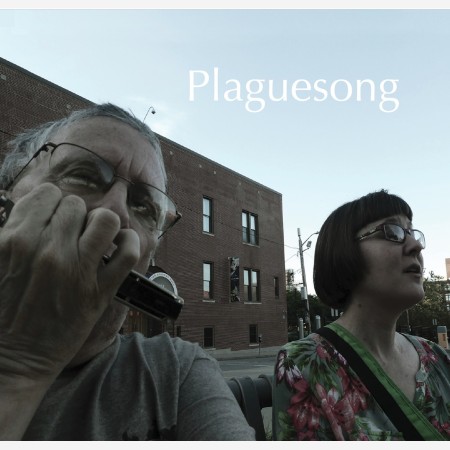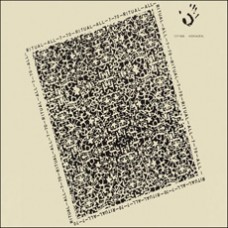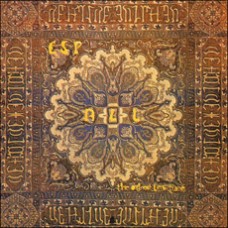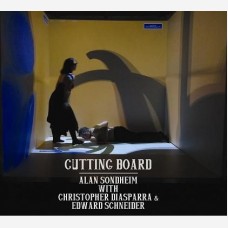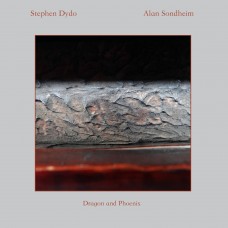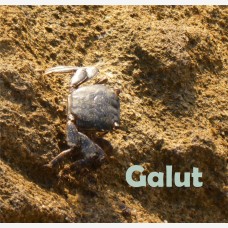Alan Sondheim & Azure Carter
Plaguesong
Alan’s notes for this
album: “Plaguesong was produced under
quarantine; there’s minor background sound on occasion. Azure Carter and I
worked in a single room, recording with a Zoom H4n, editing in Audition. I’ve
kept pursuing speed and its issues, but I’m also playing through isolation,
depression, anxiety, and fear. So there are slow hymn movements, breathing
slowly, allowing a kind of exhaustion to determine the lengths of speeded
elements. I don’t know what kind of music this is, but it’s a kind that suits
me, and suits Azure as well. It’s certainly music that goes closer to the edge
than anything I’ve done before. We’ve looked out on snow and rain, high winds,
violent storms, sunny days. We’ve known deaths of others. The music sinks into
the ground, always getting closer to the roots that make it sound. The room has
little resonance; I’ve ordered that. I’ve also decided not to name the
instruments for the most part; it’s the music and space that’s important. It
carries a sense of urgency and ululation. It’s part of us.”
Alan Sondheim made two albums for ESP-Disk’ in the ‘60s; he returned to ESP in 2014, and this is his third album since then, the first on ESP to include longtime partner Azure Carter, and his fifth overall on the label. Sondheim, who has prolifically spread his recent musical evolution across a variety of other labels, is an impulsive musical adventurer who uses his dizzying array of instruments for what their sounds can contribute to his musical style; he is not unaware of the traditional performance techniques of his instruments, but he never lets his musical expression be limited by or to those techniques. His band Ritual All 70 was included on the notorious Nurse with Wound list of outsider/avant-garde influences.
Azure Carter is a singer/songwriter living in Providence, RI. She is a frequent collaborator on music, video, and performance with her partner, Alan Sondheim. Before moving to Providence, Carter lived in NYC and performed at numerous venues in the city and elsewhere, including the 92nd Street Y, Dance New Amsterdam, The Bowery Poetry Club, Eyebeam, Jack, and Highwire Gallery. She has recorded six albums; this is her first album with ESP-Disk.
Track Listing:
01. As Aboves So O As Below
02. Creatures
03. Dad
04. Depress
05. Derelict
06. Guqin
07. Lada
08. Maya
09. Mno
10. Mourning Song
11. Musima
12. My Life
13. Never
14. Plague Hymn
15. Promised Land
16. Pulse
17. Qifteli
18. Rababa
19. Sentence
20. Snarl
21. Temperature
22. Violab
23. World
Personnel: Azure
Carter: voice, lyrics, and instruments; Alan Sondheim: instruments
Press Quotes:
During a Pandemic, An Infectious Album for the Betterment of Us All
The album Plaguesong, contains twenty-three tracks, which feature the duo of Alan Sondheim on instruments and Azure Carter as singer-songwriter on half the tracks, while Sondheim presents solo instrumentals on the other. The album, released in 2020, came out at the height of the COVID-19 pandemic, which continues a year and half later into the middle of 2021, hence, the album’s title. Overall, the album is sonically infectious during a time of infection.
The first track, “As Above, So As Below,” sets the listening experience. It begins with Sondheim on harmonica and Carter singing, “I’m taking a trip to heaven, to heaven I will go, I talk to God, and She did say, as above so as below…The world's a world without its end.” In a sense, the album begins with an imaginary death but to a “heaven” that is different than one taught about in Sunday school.
Many of the tracks underscore the simplicity of this duo with Carter singing original lyrics and Sondheim on a variety of instruments that also include pithkiavlin, viola, guitar, and qifteli. These are alternated with instrumental tracks only in order to showcase Sondheim’s multiple talents, especially with ancient string instruments, such as on track six’s “Guqin,” which features lovely playing; or track eleven’s “Musima” stressing his guitar inventiveness, and then the very lovely “Rababa” that uses what is considered one of the oldest string instruments in the world originating from Egypt.
Just past mid-way through the album, we have what feels like a climax, if one considers it as a continuous narrative of linked tracks. “Plague Hymn” on track 14 revives Sondheim on a rare Hohner Chordomonica harmonica, slower and lower pitched, and without Carter’s lyrics; as if his partner has succumbed to the plague, to the pandemic. However, as if presenting the other side of the coin, it is followed by the track “Promised Land.” Sondheim plays solo on the viola de Braga, yet it is pluckier and more upbeat, as if there is hope ahead. The speed of Sondheim’s strumming creates a sense of anticipation, as if I were running down the road and up the hill with him to see what’s ahead; hopefully to find Carter on the other side.
Carter returns on track 16 with “Pulse,” simply reciting 93/79, 93/80, that is, blood pressure readouts. And then later in track 21, “Temperature,” she again recites simply the bodily sign of “98.6.” It is as though for most of the last half she is perhaps the untouched partner taking the pulse and temperature of Sondheim, who has perhaps been suffering, and that this album is a result of a “pandemic fever”?
However, by the end of the album on track 23 with “World,” both are re-united. Carter sings her lovely complete phrases again and Sondheim plays an Irish banjo in such a way that you can detect a sense of tentativeness in his fingers. Carter sings, “What I have wanted to describe, what is indescribable, the tendency of my work…the idiocy of the real, when there is death….” She proceeds to describe the mundane details of a room, wondering if “the chair needs repainting?” Perhaps she is distracting herself from a chaos outside the door or, maybe, she indicates that she and Sondheim have come out the other end of their emotions during a pandemic.
Overall, the album’s recording has the sensibility of Carter and Sondheim walking along the lonely roads of a pandemic-ridden world with his instruments and her notepad for lyrics; stopping on occasion at a vacated house to record Carter’s expressive words and Sondheim’s instrumental musings and improvisations; doing it for themselves, but taking the time to make a recording as well, in order to share with us that there is still human vitality in the world worth listening to. - Tyler Stallings on culturecatch.com
Tyler Stallings is a writer, filmmaker, and curator living in Southern California. His most recent book-length collection of essays is Aridtopia: Essays on Art & Culture from Deserts in the Southwest United States. He also co-curated and co-edited Mundos Alternos: Art and Science Fiction in the America. More information at www.tylerstallings.com
| PURCHASE OPTIONS | |
| Digital download | Choice of WAVs or MP3s |
| Compact Disk | CDR in wallet package |
Related Products
Ritual-All-7-70
Alan Sondheim was the young, exuberant leader of a pack of improvisers living in a communal loft in..
$8.99
T'Other Little Tune
PersonnelPaul Phillips (tp) Gregert Johnson (fl, picc, moog) John Emigh (ts -2,4) June Sondeim (p, ..
$8.99
Cutting Board
Alan Sondheim is the first artist from ESP-Disk's 1964-75 heyday to return, since it was revived in..
$8.99
Dragon and Phoenix
Dragon and Phoenix refers to the names of the sound holes on the Chinese instrument known as the g..
$8.99
Galut: Ballads of Wadi-Sabi
Alan Sondheim was the first artist from ESP-Disk's 1964-75 heyday to return, since it was revived ..
$8.99

